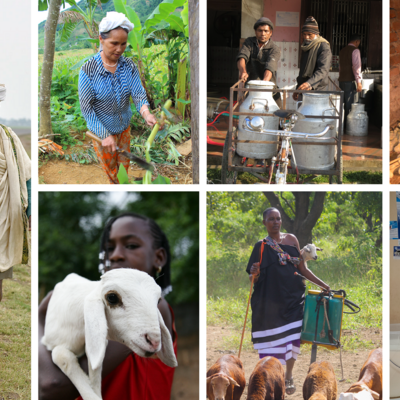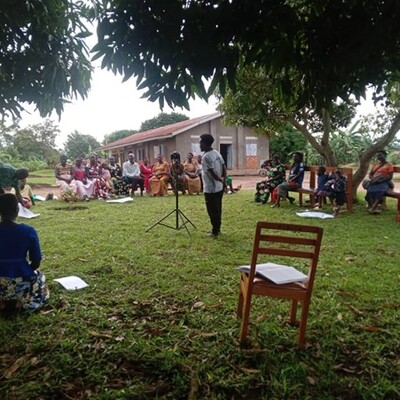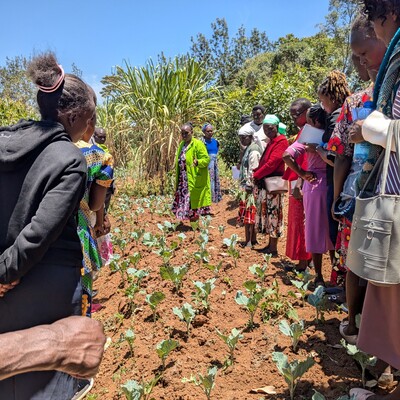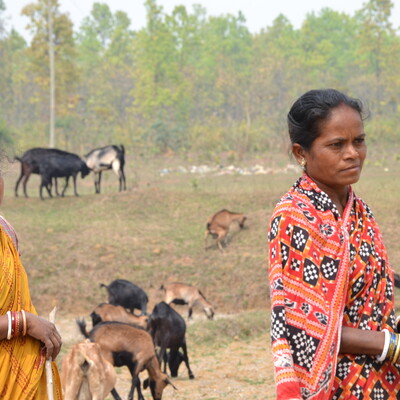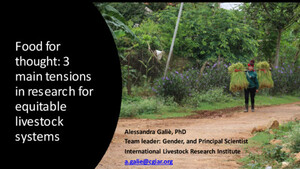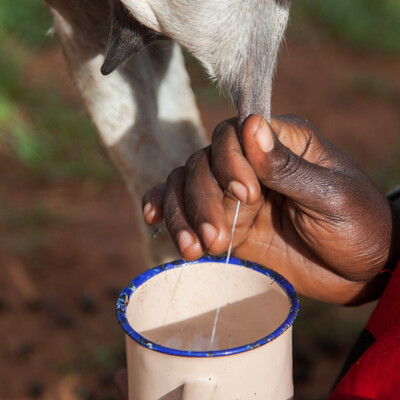

Community conversations transform relationships between men and women to reduce livestock disease risk
It’s a sunny Tuesday morning in Doyogena - a district in the south of Ethiopia. Women and men, young people and elders, religious leaders and district officials are gathering for a “Community Conversation” - a unique approach that stimulates thoughtful dialogue and a common vision for the future.
Today they’re discussing gender and animal disease risks. After a long conversation, the facilitator asks a provocative question about the unequal share of household chores. At first, the community responds by denying a problem with this but after further probing from the facilitator, a woman stands up and says: “Why do we overburden women with this?”
Another woman follows her lead: “It’s because of the culture…we are dragging because of what we believe in…men don’t even consider us as humans.” The group is stunned into silence. Finally a man stands up to say: “This is not right. We must not treat our wives like this. We are so sorry.” Other men nod their heads, and together the group begins to discuss how men can better help women around the home.
Transformative discussions such as these have been happening across Ethiopia over the past four years.
“We’ve worked with 1,600 male and female community members in five communities so far and we’re seeing everything from better safety practices when handling sick animals, to increased awareness of the risks of anti-microbial resistance,” said Annet Mulema, Senior Program Officer at the International Development Research Centre (IDRC) who led the development of the Community Conversations approach while previously working as a social scientist-Gender at the International Livestock Research Institute (ILRI).
Livestock farmers are at high risk of many zoonotic diseases due to direct contact with their livestock through practices such as home slaughter, poor sanitation, handling sick animals or consuming raw or undercooked meat or dairy.

Photo A. Habtamu/ILRI
Yeshidagrea Tarfere is a farmer in Menz, Ethiopia. After participating in community conversations he started wearing gloves when assisting livestock births and washing hands before and after handling animals.
With many thousands of diseases possibly circulating in the environment, researchers from ILRI and the International Center for Agricultural Research in the Dry Areas (ICARDA) wanted to understand which diseases the farmers saw as a priority. But they also wanted to dig deeper - to better understand what role women play in animal health management and whether they wanted to tackle the same diseases as the men in their village.
Through a series of focus group discussions, they found that women had a good understanding of livestock diseases and prioritized almost the same diseases as men did. But, more importantly, the different roles that women and men played in managing animal health meant they were at higher risk of exposure to different animal diseases.
“Traditionally women are responsible for labour-intensive activities such as feeding, watering, and cleaning barns while men are responsible for selling the animals at market and making decisions,” Mulema said.
Key to overcoming these risks was understanding the power dynamics at play.
“Even though women play a large role in livestock production, culturally men are conditioned to undervalue their role. This affects women’s ability to access and control resources, for example, they are not invited or are too busy, to meet with visiting extension agents who could provide them with livestock training and advice, increasing their awareness about how to limit their exposure to animal diseases,” Mulema said.
The researchers set out to help communities see and address the way these constraining beliefs were impacting on community and animal health, hoping that truthful conversations would help involve more women in decision-making.
“When women are part of the conversation then everyone benefits,” Mulema said.

Photo A. Habtamu/ILRI
Yeshi Gizaw (left) and her husband Sintayehu Gashahyider demonstrate how they have begun to share chores at home. Gizaw has also been learning how to share in other farming tasks normally reserved for men.
Not all conversations are created equal
The researchers explored a number of different ways for these conversations to take place, from household level discussions to community-level conversations. They quickly realised that, due to the collective way that herds were managed in a village and the nature of zoonotic disease outbreaks, a community level approach was necessary to ensure diseases could be adequately controlled.
“As soon as animals from different herds interact through grazing and watering points, they are like one herd. So if only one farmer vaccinates their animals or tries to introduce strategic de-worming programmes, their herd will constantly be exposed to the infection pressure from the untreated animals,” Mulema said.
They looked beyond the field of animal health management, to a participatory approach often used in public health interventions called Community Conversations, where trained professionals create a safe space for community members to have authentic conversations about important topics.
Teaming up with partners from local research institutes, development and extension agencies, the ILRI and ICARDA team adapted the Community Conversations approach to meet the needs of five rural farming communities in the highland and lowland regions in Ethiopia.
They identified areas of high priority for the communities - animal welfare and livelihoods; anti-microbial use and resistance; gender and zoonotic disease risks; animal feeds, health and collective livestock marketing; and gender division of labour, structures and institutions – and developed them into four training modules.
They also recruited local researchers, development partners and extension agents – many of whom had existing connections to the community and could speak the local dialects - to act as Community Conversations facilitators and process note-takers, providing them with training, mentoring and coaching needed to undertake the role.
“It’s really important that those who run the sessions see themselves as facilitator, and not as teachers. Otherwise they just impose their ideas on the community and don’t leave the space for the communities to come up with their own ideas,” Mulema said.
The delivery of each of the four modules followed a structured action learning and reflection process, informed by behaviour change models. This means that the facilitators first helped the community explore their current attitudes, knowledge and practices. They then introduced new knowledge to supplement what the community already knew and address any knowledge and practice gaps, and finally they guided the community to come up with their own action plan.
It’s quite a different approach than the traditional workshop environment that farmers are used to, said Mamusha Lemma, capacity development and innovation expert at ILRI, who oversaw the development, delivery and documentation of the Community Conversations process.

Photo A. Habtamu/ILRI
Members of a Menz community discuss what they learned in previous meetings. Community Conversations are generating discussions that challenge gender norms and disseminate health messages in rural communities in Ethiopia.
“Normally, when you enter into a community and you facilitate these kinds of discussions, initially people tend to portray the ideal picture. For example, they will say there is no gender segregation - men do whatever women do, women do also whatever men do, we equally share,” he said.
“With Community Conversations, the facilitators use locally appropriate action learning methods to create a space where communities feel able to be honest and open up in ways they haven’t before.”
Take, for example, a recently held Community Conversation on animal feeds. The discussion began as you might expect, focusing on the community’s conceptions of feed, but as the facilitator scribed what they were hearing, they did something fundamentally different.
“We listed the contributions women were making separately to the contributions from men. And when it was time to refer back to the list, we pointed out that we noticed that men had made more contributions. So we asked them - ‘what does this mean? Does this mean that men know more about feed than women?’ This provoked a discussion about access to information - women say that the men are more knowledgeable about this issue because [women] don’t go to training. So we ask them ‘what is the consequence?’” Lemma said
“The further we probe and encourage and challenge them, the more they start to question their own attitudes and challenge one another, until ultimately they realise that they are constraining their own development. It’s transformative,” he said.
Getting to the root cause of inequality
Community Conversations have come to be seen as ‘gender transformative’ because, unlike other approaches, it gets to the root cause of gender inequality. A study published by the research team in 2020 showed that Community Conversations changed community attitudes and behaviours regarding gender roles, which benefitted women’s access to and control over resources and decision-making in households and led to better safety practices when handling sick animals.
In particular, husbands and wives both participating in Community Conversations was most effective to change household gender dynamics.
“They were all very committed to apply the knowledge they gained from the conversations,” said Wole Kinati, research associate at ICARDA.
“We saw men enthusiastically agreeing to share domestic work to enable their wives to participate in training and meetings. And men committed to ensure that whenever extension agents visit that they will invite their wives to participate in the discussion.”
And it also catalysed initiatives to work collectively to improve animal health, with community members organising themselves to access services such as deworming and vaccination of sheep. And it transformed local institutions, such as fisheries groups, which decided to include women as members after participating in the Community Conversations process.
Amid growing interest from other researchers, Lemma is already developing more topics. Creating a masterclass that helps facilitators develop their own Community Conversation topics is the next challenge.

Photo A. Habtamu/ILRI
After participating in community conversations, this fresh fish farmer group in Menz, Ethiopia, invited women into their farming group and trained them to raise and care for fish.
Embedding in extension
The success of the Community Conversations has attracted the interest of local government representatives, who are keen to embed the approach in Ethiopia’s national extension system.
To support this, ICARDA and ILRI researchers have developed a facilitation guide for integrating Community Conversations into animal health extension services that synthesizes their experiences and learnings and provides guidance for any practitioner wanting to offer the approach to the communities they work with.
The guide has already been embedded in a number of other ILRI programs and government extension partners have committed to use the guide in their annual training for development agents.
Indeed, there was a strategy in choosing facilitators who were also local service providers and knew the local context, Lemma said.
“They have the mandate to support the community’s action plan by adapting their services to better meet the community needs, and being jointly accountable for the implementation of the community action,” he said.
“We hope this experience will help to enhance the capacity of local partners to engage community members in a more participatory way.”
Partner also experienced the transformational and engaging power of the approach and shared intentions for applying Community Conversations in their extension work.
After receiving training from ILRI, Dr Belay Elias, who works at the Doyogena District Livestock and Fish Development Office, has been using the Community Conversation approach to help with their delivery of artificial insemination technology.
“Giving formal training to farmers may mean they do not understand or are unclear about a new idea. But Community Conversation fills this gap very much - as farmers discuss and make their own conclusions, the community easily understands new ideas more,” he said.
The research team’s big hope is that “every extension agent, whether they be for animal health or breeding or forages or market access, receive training in how to run Community Conversations,” Mulema said.
And if it can help to create more of the changes made by the men in Doyogena then that can only be a good thing. According to one male community member: “After the Community Conversations, I’ve [learned that] when you lead a household, you have to do it in a more collaborative and consultative manner. If you think you are the head and can do everything or decide alone, then you are most likely to fail. You cannot clap with one hand. The community conversations make us rethink and question what we do and why we do it”.
Thank you to Dr Adem Kumbe from Oromia Agricultural Research Institute, Tesfalem Nane from Areka Research Centre, Barbara Wieland and Mesfin Mekonnen from ILRI for their contributions to this piece.
Banner photo: Community Conversations are generating discussions that challenge gender norms and disseminate health messages in rural communities in Ethiopia. Photo A. Habtamu/ILRI
--
Learn more:
- Brief: Community conversation: An approach for collaborative learning and action in animal health management (2021)
- Paper: Clapping with two hands: Transforming gender relations and zoonotic disease risks through community conversations in rural Ethiopia (2020)
- Outcome story: Gender approaches to livestock in Ethiopia (CGIAR 2019 Annual Report)
You may also like
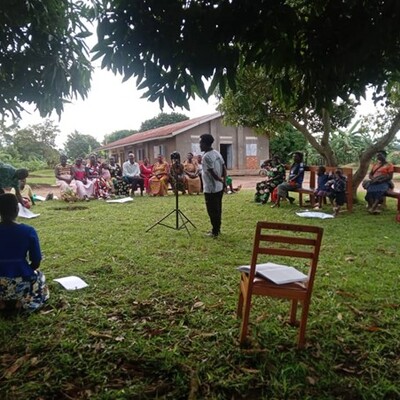
ILRI News
Addressing gendered constraints to women’s empowerment and restrictive gender norms: The case of engaging women and men in pig-related business activities in Uganda

ILRI News
Burkina Faso sets up One Health community platforms to improve food security and public health in rural areas
Related Publications

Gender considerations in innovation platforms in the livestock sector in Mali
- Gning, S.B.
- Dione, Michel M.
- Sene, M.T.D.
- Sow, Ahmadou
- Fall, Abdou

Gender relations and women's empowerment in small-scale irrigated forage production in the Amhara and SNNP Regions of Ethiopia
- Omondi, Immaculate A.
- Njuguna-Mungai, Esther
- Bezabih, Melkamu
- Teufel, Nils
- Galiè, Alessandra
- Njiru, Nelly
- Kariuki, Eunice
- Mulema, Annet Abenakyo
- Baltenweck, Isabelle
- Jones, Christopher S.
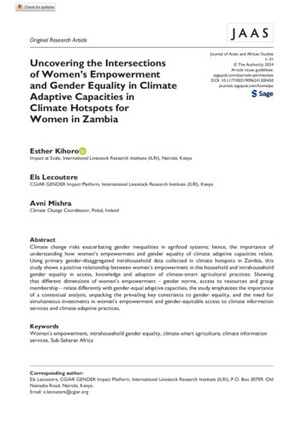
Uncovering the Intersections of Women’s Empowerment and Gender Equality in Climate Adaptive Capacities in Climate Hotspots for Women in Zambia
- Kihoro, Esther
- Lecoutere, Els
- Mishra, Avni

A qualitative inquiry of the effects of social protection and nutrition education on climate resilience of rural women and their households in southern Bangladesh
- DuttaGupta, Tanaya
- Roy, Shalini





